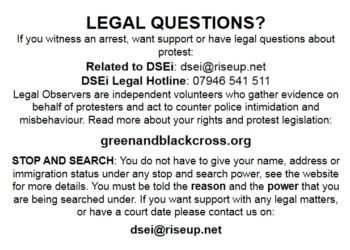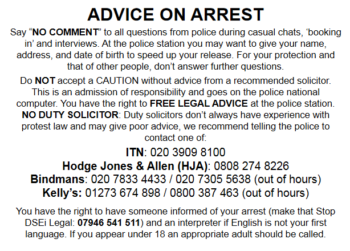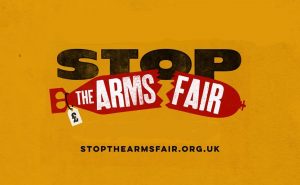Know Your Rights
When going on any protest, it is important for you to know your rights.
This is so you can prepare yourself, and also act in solidarity with other people. The police are institutionally racist, and as a result, often people of colour are treated differently on demonstrations than white people. Be aware of this when you are protesting against the arms fair.
This page runs through Green and Black Cross‘ key advice while going out on a demonstration. We also have a ‘mic check’ of this information to be read out at each day of action.
To learn more, you can watch a recording of a Stop the Arms Fair 2019 Know Your Rights Webinar.
If you are looking for laws often used on demonstrations, or possible scenarios for arrest and their possible consequences, see the following pages:
No Comment
You do not need to answer police questions, so don’t.
This is for your own protection and for the protection of others. This applies on demonstrations, during Stop and Search procedures and during arrest. This includes your visa status.
The police will try to pressure and deceive you into incriminating yourself and other people. Instead of trying to decide when it seems ‘safe’ to answer, just say “No comment” to all questions – out on a demo, during ‘informal chats’, in the police van and especially in interview.
If arrested, and your friend in the next cell knows you aren’t going to talk, they will feel better able not to talk themselves. Remember, interviews only help the police – they will not interview you if they already have enough evidence to charge you.
A good solicitor will sometimes suggest that you make a prepared statement in interview. In that case, you or your solicitor will read the statement and you should answer “No comment” to any more questions.
For a longer discussion, the booklet “NO COMMENT” that was produced by the now defunct Legal Defence and Monitoring Group is excellent.
No Personal Details
You do not have to give personal details under ANY stop and search power, so don’t.
On protests, the police often use searches as a way of finding out who is present, both for intelligence purposes and to intimidate you.
Police also use arrest as a means of gathering information, particularly when they arrest a large number of people together (a “mass arrest”).
You do NOT have to give your personal details to the police at any point during the arrest process. In fact, you are not legally required to give any personal information until you appear in court.
Under What Power?
Ask “Under what power?” to challenge the police to act lawfully
Some police officers rely on you not knowing the law. If you are asked to do something by a police officer, ask them what power (i.e. what law) they are using and why they are using it. Make a note of what was said, by whom (numbers) as soon as possible afterwards.
Don’t let them turn this into a situation where they ask you questions though – just walk away once you have your answer, and remember: No Comment!
No Duty Solicitor
If you are arrested, use a recommended solicitor with protest experience
The “duty solicitor” is the solicitor who is present at the police station. They may come from any firm of solicitors, which means they almost certainly know nothing about protest.
Duty solicitors often give bad advice to protesters; we recommend you always use a good solicitor who knows about protest.
No Caution
Cautions are an admission of guilt
Offering you a caution is a way the police may ask you to admit guilt for an offence without having to charge you. It is an easy win for the police, as they don’t have to provide any evidence or convince a court of your guilt.
At the very least, you should never accept a caution without taking advice from a good solicitor.
You can find more detailed explanations of this advice on the Green and Black Cross website.
Stop The Arms Fair Bustcard
Green and Black Cross have produced a special bustcard – a card to carry on you during the week of action, providing you with their key advice, information on stop and search and arrest, and the names and numbers of solicitors who can help you – for the 2021 week of action to #stopDSEI, including a dedicated email contact dsei@riseup.net. Download a printable version from their website, or make sure to pick one up from the welcome tent or a Legal Observer as soon as you arrive on site.




